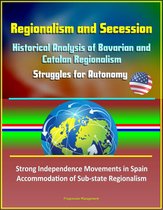Essential Guide to Catalan, Catalonia, and the Claim of Independence from Spain: Reports on Autonomy, Language, Culture, Economy, Regional Issues, Comprehensive Spanish History, and Barcelona Ebook Tooltip Ebooks kunnen worden gelezen op uw computer en op daarvoor geschikte e-readers.
Afbeeldingen
Sla de afbeeldingen overArtikel vergelijken
- Engels
- E-book
- 9781370850884
- 12 oktober 2017
- Epub zonder kopieerbeveiliging (DRM)
Samenvatting
Gain a better understanding of the ongoing crisis in Spain over the separatist movement for Catalonia. A controversial independence referendum in October 2017 plunged the nation into turmoil as the Catalan region threatens to tear the country apart. Several scholarly studies are included in this compendium about the issue. Contents include: Regionalism and Secession, The Spanish Mosaic: A Conflict Management Model for Regionalism, Spain and Its Relations with the United States: In Brief, Spain: Current Issues and U.S. Policy, and Spain: Country Study - Area Handbook Series (Excerpt).
***
Spain's imperial decline itself was not a direct cause for its failed nation-building project and the rise in Catalonian regionalism, but it allowed for regionalist sentiment to grow. Each consecutive loss of Spain's colonies struck a progressively stronger blow at the physical and emotional bonds that held Spaniards together. The decline of the empire led to a waning sense of solidarity. Small difficulties that Catalonia previously endured in exchange for access to imperial markets and potential influence in Madrid became increasingly problematic, leading to confrontations between Castile and Catalonia. This section explores the foundations of Spain's empire and assesses the impact that imperial losses had on the Spain's unity. Tying the Knot: The Foundations of the Empire - Any sense of shared Spanish identity hinged upon the people's connection to the unified crown and its associated empire, rather than on institutional ties. In 1469, Ferdinand of Aragon married Isabella of Castile to form a new dynastic union.150 This union, which led to Spain's greatest power and influence during its golden age (1517 to 1665), precluded the need for Spanish monarchs to internally consolidate their territories, failing to develop a strong notion of national identity.151 Catholicism, the only common religious and political institution served as the foundation for the unity of these two kingdoms. Furthermore, Catalonia like the other two territories comprising the Aragonese crown, maintained its own institutions. One factor that may have created resentment from the start was that Castile was the dominant partner in the marriage. The relationship favored Castile, and Castile's political leaders initially made no attempt to integrate Aragonese people or institutions. While the Crown of Aragon in the early 16th century began a slow recovery, "after centuries of expansion followed by a period of decay," beginning a slow recovery, Castile, as John Huxtable Elliott notes, entered a "period of economic and military expansion." Despite their strength, many Castilian nobles were jealous of the Catalan autonomy. Queen Isabella opined, as translated by Elliott, that "it would be better to reduce the Aragonese by force than to suffer the arrogance of their Cortes." Though she did not forcefully subdue the Kingdom of Aragon, this mentality, likely held by many Spanish nobles, reduced the trust between the two kingdoms and hindered future joint endeavors. Many Catalans perceived Castile's attempts at nation-building, regardless of Castile's intentions, as punitive measures. By the second half of the 16th century, Castilians were beginning to take the most prominent positions in government, causing Catalans, as Elliott explains, to shut "themselves off from any possibility of future cooperation with the Crown." The economic benefits of the New World also fell largely to the Crown of Castile, which administered the American possessions, given that Aragon and Castile remained separate but in name only.
Productspecificaties
Inhoud
- Taal
- en
- Bindwijze
- E-book
- Oorspronkelijke releasedatum
- 12 oktober 2017
- Ebook Formaat
- Epub zonder kopieerbeveiliging (DRM)
Betrokkenen
- Hoofdauteur
- Progressive Management
- Hoofduitgeverij
- Smashwords Edition
Lees mogelijkheden
- Lees dit ebook op
- Android (smartphone en tablet) | Kobo e-reader | Desktop (Mac en Windows) | iOS (smartphone en tablet) | Windows (smartphone en tablet)
Overige kenmerken
- Studieboek
- Nee
EAN
- EAN
- 9781370850884
Je vindt dit artikel in
- Categorieën
- Taal
- Engels
- Boek, ebook of luisterboek?
- Ebook
- Beschikbaar in Kobo Plus
- Beschikbaar in Kobo Plus
- Beschikbaarheid
- Leverbaar
Kies gewenste uitvoering
Prijsinformatie en bestellen
De prijs van dit product is 8 euro en 28 cent.- E-book is direct beschikbaar na aankoop
- E-books lezen is voordelig
- Dag en nacht klantenservice
- Veilig betalen
Rapporteer dit artikel
Je wilt melding doen van illegale inhoud over dit artikel:
- Ik wil melding doen als klant
- Ik wil melding doen als autoriteit of trusted flagger
- Ik wil melding doen als partner
- Ik wil melding doen als merkhouder
Geen klant, autoriteit, trusted flagger, merkhouder of partner? Gebruik dan onderstaande link om melding te doen.








